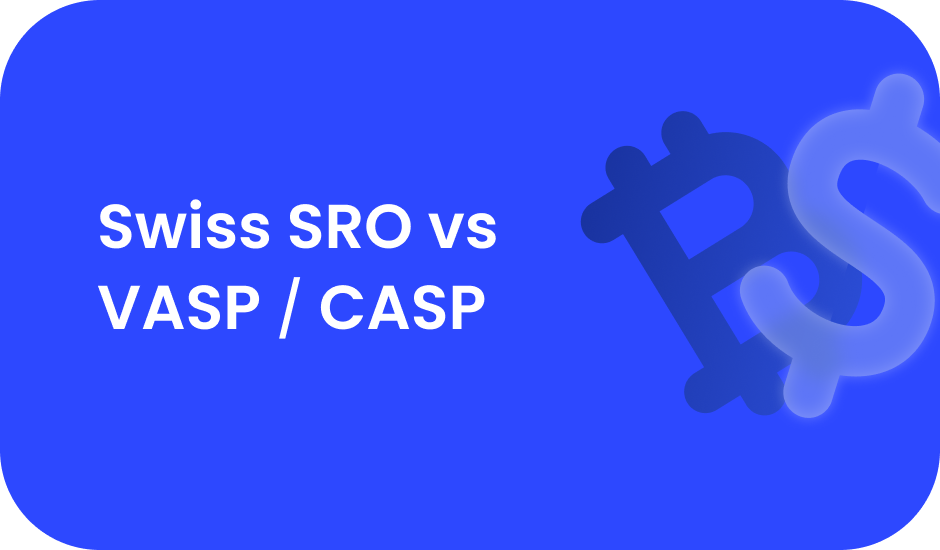According to the latest Cambridge JBS report, regulatory approaches to crypto-assets continue to vary significantly across jurisdictions, creating strategic opportunities for regulatory arbitrage. For crypto businesses, choosing between a Swiss SRO and a VASP/CASP framework can determine time-to-market, compliance complexity, operational scope, and cost structure. This article breaks down the critical differences between Swiss SRO registration and VASP/CASP licensing models to help founders, compliance officers, and legal teams make an informed decision.
What is Swiss SRO?
In Switzerland, financial intermediaries such as crypto exchanges, wallets, and brokers are subject to Anti-Money Laundering (AML) laws. Rather than obtaining a full financial license, many firms opt to become members of a Self-Regulatory Organization (SRO) — a private entity supervised by FINMA, Switzerland's financial regulator.
Membership in an SRO like VQF ensures AML-compliant operations without the burden of full licensing. The onboarding process typically takes one to four months depending on the business model and internal readiness. Companies must establish a Swiss legal entity, secure a local office, develop internal AML policies, appoint responsible compliance officers, and prepare for regular audits.
Unlike the VASP or CASP regimes, Swiss SRO registration is far more accessible. The capital requirements are lower, the bureaucracy is significantly reduced, and the time to launch is faster. Businesses gain a legally recognized, fully compliant status with the reputation benefits of the Swiss regulatory environment — without waiting 6–12 months or spending six figures on legal prep.
For crypto entrepreneurs and startups, this model offers a direct and reliable way to get to market without unnecessary delay. If your business doesn’t require complex licensing for high-risk activities, SRO is likely the smartest path to begin operating today.
What is VASP and CASP?
VASP, or Virtual Asset Service Provider, is a classification defined by the Financial Action Task Force (FATF). It includes businesses offering services such as crypto exchange, custody, or transfers. Various countries have adopted VASP registration regimes based on this model, including Lithuania, Estonia, and Georgia.
CASP, or Crypto Asset Service Provider, is the regulatory framework introduced under the European Union’s Markets in Crypto-Assets Regulation (MiCA). It sets out comprehensive compliance standards for firms operating in the EU, covering operational resilience, consumer protection, capital adequacy, and governance. CASP authorization will be mandatory for companies targeting the EU market starting in 2024.
Compared to Swiss SROs, the VASP and CASP regimes involve higher entry barriers, longer timelines, and broader regulatory scope. The structure is demanding — with high initial setup costs, stricter reporting obligations, and slower approval processes. While the CASP license grants access to all EU markets, it’s not the most practical starting point for crypto ventures still building traction.
Comparison Table: Swiss SRO vs VASP / CASP
When to Choose Swiss SRO
Swiss SRO registration works best for early-stage crypto businesses aiming to launch quickly with legally recognized operations. It's ideal for companies whose services fall within the scope of AML-regulated activities, such as crypto-to-crypto exchanges, custodial wallets, or OTC desks. If your target market is global and not exclusively tied to the EU, SRO registration provides a stable regulatory base with lower cost and faster execution.
The process is straightforward, and our legal team at BMP Global has a 100% success rate helping crypto companies get SRO approval through our partnership with VQF. We handle the entire journey — from company formation and compliance documentation to final application and post-registration support.
If you're looking for the most practical and affordable way to start a compliant crypto business in Switzerland, Swiss SRO registration is your clear advantage.
When VASP / CASP Makes Sense
Businesses with a core focus on the European Union or those targeting institutional clients benefit from applying for VASP or CASP licensing. The MiCA framework brings consistency to crypto regulation across all EU member states, enabling licensed firms to operate under a single market passport.
This path is well-suited for companies offering advanced financial services such as crypto lending, token issuance, staking, or algorithmic trading. Although the licensing process involves more effort and cost, it ensures long-term legal certainty, investor trust, and access to premium banking and partnerships.
For founders with EU-focused ambitions, CASP may be necessary — but starting with a Swiss SRO can provide operational runway, proof of compliance, and market readiness ahead of the more demanding MiCA process.
Hybrid Strategy: Start with Swiss SRO, Expand to VASP/CASP
Some firms adopt a phased approach by starting under the Swiss SRO regime and expanding to VASP or CASP once operations are established. This hybrid path allows founders to validate their business model and build internal compliance capabilities while reducing upfront legal risk.
It can also improve fundraising outcomes, as investors often view operational history and regulatory milestones as indicators of maturity. When transitioning to a VASP or CASP license, companies with an SRO background are better positioned to meet documentation and governance requirements.
This is especially attractive to fast-moving startups who can’t afford to wait a year just to launch — and would rather build with regulatory certainty from day one.
Final Thoughts
Swiss SRO and VASP/CASP frameworks serve different needs depending on market focus, product complexity, and strategic goals. But for the vast majority of crypto startups, Swiss SRO registration offers the ideal mix of speed, credibility, and compliance — without the delays, complexity, or high costs of full licensing.
If you're ready to launch your crypto venture with Swiss regulatory legitimacy, BMP Global is here to help. Book a consultation and see how simple and accessible Swiss SRO registration can be.













